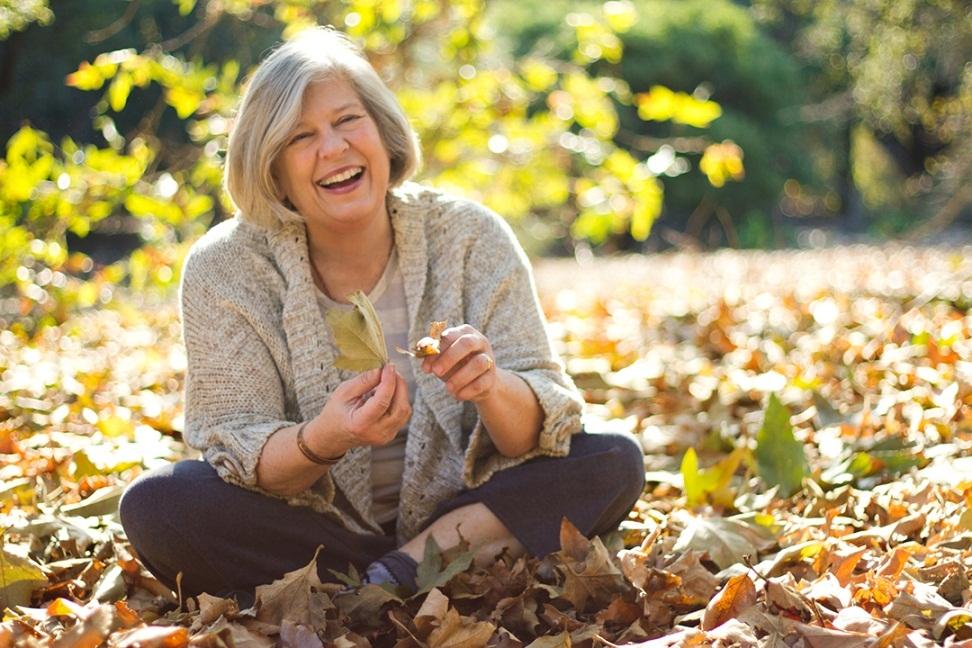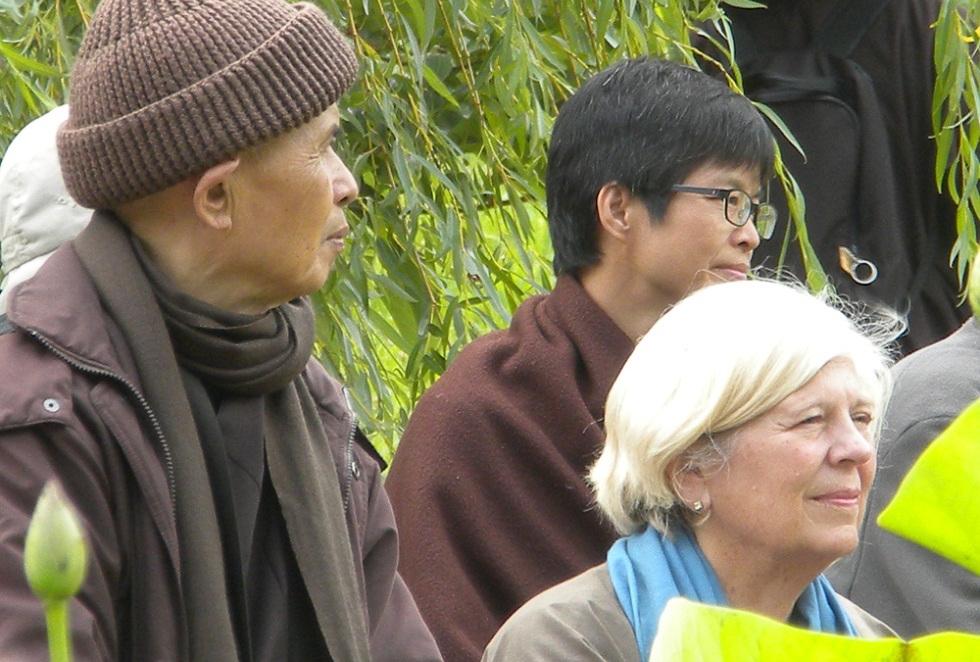
“We get away with stuff sometimes, being American crazy laypeople,” says Peggy Rowe Ward, and then she starts to chuckle. It turns into a deep, bubbling, joyous laugh. A lay teacher in the Vietnamese Zen tradition of Thich Nhat Hanh, Rowe Ward has taught in the United States, Thailand, Hong Kong, China, and France, and traveled with monks and nuns from that lineage around the world. “I know how I am experienced in many different cultures. I’m loud, I’m bold, I’m embarrassing. I’m outrageous!”
Rowe Ward is irrepressibly herself—funny, caring, self-deprecating, and conscious of the atmosphere that she creates with her words. She uses this identity to model what she preaches. With her teacher’s encouragement, Rowe Ward has learned to embrace what she calls her “feminine” teaching methods, and has developed an “embodied practice” that includes art, psychology, body movement, and a focus on relationship: she often co-teaches the Dharma with her husband. This makes her one of the more unusual teachers today, as well as a representative of how men and women can work together to convey the Dharma.
Her confidence in her own unconventional methods allows her to create a safe space for her students, helping them to step inside Buddhist teachings with their entire being rather than just cognitively. “I’m a very experiential teacher. I’m always looking at what experience we can create to integrate the Dharma talk,” she says. “I don’t need to have things spelled out with definitions—this is this and this is this. To me, this is about love and kindness and respect and compassion.”
Peggy Rowe Ward first met Thich Nhat Hanh in 1991. Recently widowed, she was struggling emotionally, “barely leaving the house.” She was familiar with Buddhism but found many of the texts “really inaccessible, really cognitive and analytical,” so when she heard about a retreat entitled Peace is Every Step, she decided to be brave and try it. After the five-day silent retreat, “I had so much healing,” she says.
She took lay priest vows in 1994 and was ordained as a Dharma teacher in 2001. “For the first ten years of practice I had a teacher, but I probably didn’t consider myself a Buddhist. It was when I went to China with Thich Nhat Hanh and got to be with the big Buddhas and the temples, when I prostrated—that went right into my heart.” Since then, Rowe Ward has written two books: Love’s Garden (2008), which she and her husband co-wrote on translating Buddhist practice into loving relationships, and Making Friends with Time (1999), a book on stress reduction co-written with Tracy D. Sarriugarte. She is now at work on her third book, a “toolkit of mindfulness techniques” for teachers and educators. Her background in psychology—as well as her PhD in Adult Education—influences her approach and has shaped a pedagogy based in respect, refuge, and meeting people where they are.
Safety is one of Rowe Ward’s big themes—the idea that people need to feel secure, held, and heard before they can step inside the Dharma. “The importance of safety for transformation is essential,” she says. “We can bring that just by being ourselves.” Feeling safe and respected is part of what she likes about teaching with her husband Larry Ward, also a renowned Dharma teacher. He “has her back,” she says, and they can support each other so that neither feels the burden of answering every question.
“Larry and Peggy have very different styles of teaching,” writes Sandy Coen, a founding member of Blue Heron Sangha, where the couple has led retreats since 2006. “Each has their own ‘presence’; yet they meld together wonderfully.”
“I love the way Peggy makes a ritual come alive,” writes Elaine Fisher, a candidate for lay ordination who has practiced with Rowe Ward on at least five retreats. “She brings the practice back to the body, which we can sometimes forget we even have, while demonstrating deep scholarly knowledge of the Buddha’s teachings.”
It took time for Rowe Ward to feel secure in her teaching style. She says that Thich Nhat Hanh’s encouragement helped her to feel comfortable embracing a “feminine” pedagogy: “I really connect to a feminine place of power, which is about being open and receptive and embodied. When I describe myself as a female Dharma teacher, it’s about the whole body practice.”
By acknowledging herself honestly in conversation and in her teachings, Rowe Ward projects a deep security and comfort in her own skin. “Thay [Thich Nhat Hanh] encouraged us to teach the Dharma our way, and be ourselves. That’s such a funny thing, because sometimes it’s not so easy to be ourselves, is it?”

When not co-teaching, writing, or designing mindfulness curriculum for universities and schools, Rowe Ward leads retreats for women. Her husband, an African-American with deep roots in the practices of Martin Luther King, Jr., leads retreats for people of color. Rowe Ward says “it’s just a different experience” to be on retreat with people you identify with. “Sometimes a person of color will only get that sense of safety or have the courage to enter a Buddhist practice [in a group], and the same for women.” On a more personal note, she says that all-female retreats are places of joy and fun, where women can feel comfortable opening up and being themselves.
Being honest and compassionate with yourself is also key in a good relationship, another of Rowe Ward’s major themes. In Buddhist practice, loving well is a practice that extends to ourselves, our partners, and to all beings: “The more we water the positive seeds in our partner, the more we ourselves grow, and the more our feeling of spiritual wealth and our capacity for generosity increase,” she and Ward write in Love’s Garden. In other words, relationship—traditionally a more female aptitude—is one way of reaching toward Buddhist goals of self-transformation, compassion, and awareness. In a world that often rewards individual striving, they want to honor practices of kinship and connection: “The practice of mindfulness is the practice of love,” they write. Good Buddhist practice, like a blossoming garden, invites others in.
This new year, they co-taught the practice of Beginning Anew, also using Thich Nhat Hanh’s classic metaphor of watering seeds. “We look to see what beautiful seeds are already blooming, which seeds we want to cultivate this year; we look to see what weeds have sprouted, and how to feed the beautiful things and how to stop feeding the unwholesome things.” While Ward gave a Dharma talk on store and mind consciousness, Rowe Ward wanted something more experiential. She asked practitioners to draw pictures, using the drawing to describe what their mental gardens would look like in the new year.
“We had a six-year-old who said that her weed was to stop chewing her toothbrush. The specificity is so great, because then you can look at how you can cultivate it. It’s one thing to say, ‘I want to be more compassionate.’ Well yeah, everyone wants to be more compassionate. But can you get more specific?” Without specific goals and insight into our own mental weeds, she says, we can’t quite get beyond the analytical, intellectual level and begin to practice fully.
“We know the right answers; we can take the multiple choice test on being kind,” she says. “But are we kind to ourselves?”
Rowe Ward has close ties to the monks and nuns at Plum Village, Thich Nhat Hanh’s home practice center in France. Being on staff at many of the 21-day retreats means that she has had an opportunity to watch some of the children from early retreats grow up and take vows. As a lay teacher working with monastics, she negotiates her position as one of both perpetual learner and, surprisingly, senior teacher. “I’m still kind of shocked that I am a teacher and that I am an elder,” she says. But after 25 years of studying and practicing Buddhism, Rowe Ward has developed her own interpretation of the teachings she inherited.
As Thich Nhat Hanh has recently struggled with illness, Rowe Ward no longer travels with him. Like many in his tradition, she is preparing for changes when he passes away. She has great faith in the sangha communities he has built around the world and is confident that his teachings have been transmitted as he intended. Of Thay, she says simply, “I’m going to fiercely miss him.”
The work her teacher did in equalizing gender within the sangha was important, but only a first step in a larger struggle for equality within Buddhism. “There needs to be more of us [female Dharma teachers], and we need to know how to value our way of knowing and being,” she says. “My teacher encourages me to find my way, and I’m hoping more women can share the Dharma in their own way.”













